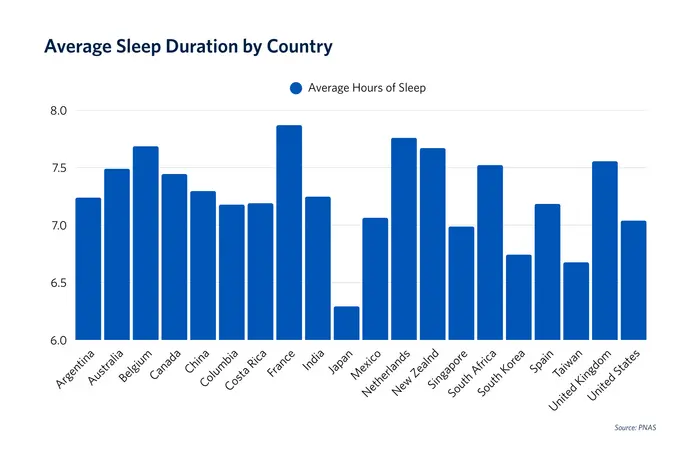The universal advice to get eight hours of sleep every night may need rethinking, according to groundbreaking research that challenges our fundamental understanding of healthy sleep patterns.
A comprehensive new study from the University of British Columbia has discovered that optimal sleep duration varies substantially between different countries and cultures, suggesting that sleep recommendations should be tailored to cultural contexts rather than applied universally. The findings, published Tuesday in Proceedings of the National Academy of Sciences (PNAS), reveal that sleeping according to your culture’s norms—not an arbitrary global standard—may be the key to better health outcomes.
This landmark research analyzed sleep patterns and health data from nearly 5,000 people across 20 countries spanning North America, Europe, Asia, Africa, and South America, making it one of the most diverse sleep studies ever conducted. Remarkably, the researchers found that despite significant variations in average sleep duration between countries, people from cultures with shorter typical sleep times showed no evidence of worse health outcomes compared to those from longer-sleeping nations.
Sleep Duration Varies Dramatically Worldwide
The study confirmed substantial differences in average sleep times across countries. Japanese participants averaged just six hours and 18 minutes of sleep, while those in France typically slept seven hours and 52 minutes—a difference of over 90 minutes. Canadian participants fell in the middle, averaging seven hours and 27 minutes of sleep.
These variations challenge the conventional wisdom that everyone universally requires a specific amount of sleep for optimal health. Instead, the findings suggest that cultural context plays a crucial role in determining how much sleep is actually needed.
“Despite the common advice to get eight hours of sleep, our findings suggest that sleep recommendations need to be adjusted based on cultural norms,” said Dr. Steven Heine, professor of social and cultural psychology at UBC and senior author of the study. “There is no one-size-fits-all amount of sleep that works for everyone.”
Cultural Norms, Not Hours, Determine Healthy Sleep
Perhaps the most intriguing discovery is that health outcomes appear to be linked more closely to how well an individual’s sleep duration aligns with their culture’s expectations than to the absolute number of hours slept. This represents a significant shift in how we should think about sleep health.
“People who slept closer to their own culture’s norms for sleep duration tended to have better overall health,” explained Dr. Christine Ou, assistant professor in the school of nursing at the University of Victoria and the study’s lead author. “This suggests that the ideal amount of sleep is the amount that matches what is considered appropriate sleep in one’s cultural context.”
The research team did identify a quadratic relationship between sleep duration and health in all countries—meaning both too little and too much sleep correlate with poorer health—but the “sweet spot” in the middle varied significantly between countries.

Key Findings That Challenge Current Sleep Guidelines
- Optimal sleep duration varies by up to 1.57 hours between different countries
- Countries with shorter average sleep durations do not show worse overall health outcomes
- Sleep that aligns with cultural norms correlates with better health, regardless of absolute duration
- In all 20 countries studied, people typically sleep at least one hour less than what was considered optimal for their culture
- The relationship between sleep and health follows a U-shaped curve, but the midpoint differs across cultures
Implications for Public Health and Sleep Medicine
These findings have profound implications for public health guidelines, sleep medicine, and how individuals should think about their own sleep habits. Rather than focusing on a universal eight-hour recommendation, the researchers suggest that sleep guidelines should be customized to reflect the norms of different populations.
The study builds on previous research showing links between sleep duration and health, but takes the unprecedented step of examining these relationships across diverse cultural contexts. The results strongly indicate that what constitutes “healthy” sleep is more flexible and culturally determined than previously recognized.
What remains consistent across all cultures, however, is the finding that most people appear to be sleeping less than what would be optimal within their own cultural context. In all 20 countries studied, participants reported sleeping at least one hour less than what was considered ideal for their culture.
Rethinking How We Talk About Healthy Sleep
For those struggling with sleep issues, these findings raise interesting questions. Should someone in Japan worry about sleeping less than someone in France? The research suggests not, as long as their sleep pattern aligns reasonably well with Japanese cultural norms.
The study underscores the need to consider cultural context when making recommendations about sleep health. One-size-fits-all advice may be not only ineffective but potentially counterproductive if it creates unwarranted anxiety about sleep patterns that are actually normal within a particular cultural context.
As sleep research continues to evolve, this study marks an important shift toward recognizing the flexibility of human sleep needs and the powerful role that culture plays in shaping not just our sleep behaviors, but the actual amount of sleep our bodies require for optimal functioning. For physicians, public health officials, and everyday individuals thinking about sleep, the message is clear: cultural context matters, and what constitutes healthy sleep in Tokyo may look quite different from healthy sleep in Paris or Toronto.
If our reporting has informed or inspired you, please consider making a donation. Every contribution, no matter the size, empowers us to continue delivering accurate, engaging, and trustworthy science and medical news. Independent journalism requires time, effort, and resources—your support ensures we can keep uncovering the stories that matter most to you.
Join us in making knowledge accessible and impactful. Thank you for standing with us!

